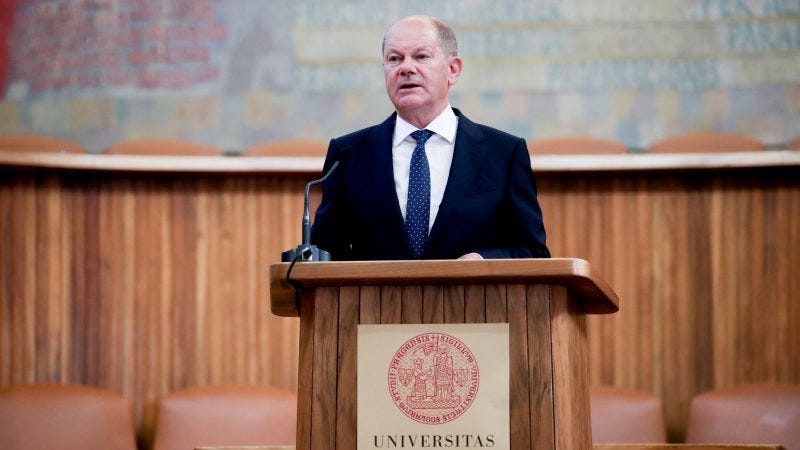Germany’s Zeitenwende: Let’s get serious!
Yersterday's speech from German Chancellor Olaf Scholz must be seen as a milestone event in Europe's recent history, franco-german relations expert Philipp Saueracker argues.
This is a guest post from my friend and colleague Philipp Saueracker. I would like to warmly thank him for taking the time to write this analysis of Olaf Scholz's speech on such short notice. More on Phillipp below.
It seems like a copy. In 2017, French President Macron gave a speech on Europe at the famous Sorbonne University in Paris, describing his ideas on the future development and need for reform of the EU.
Five years later, German Chancellor Scholz gave yesterday a speech on Europe at the equally famous Karls-University in Prague and presented his ideas for the future of the EU.

Same stage, same content?
Two factors, however, make Scholz's speech far more significant and important: First, much has changed in Europe since Macron's speech. The Corona pandemic and the Ukraine war have fundamentally changed the economic and foreign policy realities and reshuffled the political cards.
Secondly, yesterday’s speech did not come from anyone: Olaf Scholz is the head of government of the largest, economically strongest, and the EU member state with the most leverage on the future of the continent. What he said carries weight and has the potential to decisively influence major developments. This speech could prove to be a real turning point for the EU.
A profound reform of the Union
One senses when reading his speech manuscript that it is serious. That something has to happen, that things cannot go on like this. Foreign policy pressure has grown immensely in recent months. Some of his proposals sound banal at first: Advocating EU enlargement to the East in order to better cooperate with all regions of Europe and ensure more overall stability, building a European air defence system, strengthening European sovereignty by building a more independent economic infrastructure. A few words, of course, on migration and fiscal policy, that some progress has been made in these areas and that further harmonisation is being worked on.
Two proposals, however, are really special and here we can definitely and seriously speak of the much-vaunted turn of the times: the principle of unanimity in the Council and institutional reforms.
Scholz advocates abolishing the unanimity principle in the Council in favour of majority voting, first in the area of foreign policy, but also in others such as fiscal policy. And this "knowing full well that this also has implications for Germany".
Such a statement would have been unthinkable in recent years and makes it clear that Germany finally seems to have arrived at the reality of the 21st century: the global challenges such as climate change, combating pandemics, migration policy and economic competition with other global players such as China can no longer be dealt with at national level. Joint European action is necessary here, which must not be slowed down by the vetoes of individual countries. At least a German head of government is doing what many have secretly expected for a long time: taking responsibility for the European project, putting aside his national interests and keeping the long-term good of the EU and its development in mind.
But not only that. Scholz went even further and talked about reforms of the European Parliament, hinting at the advocacy of transnational lists. He also wants to make changes in the Commission and limit the number of commissioners by sharing the responsibilities of some directorate generals in order to keep the Commission workable.
Putting Germany back to the center
To what extent this will meet the approval of other countries remains to be seen. But it shows that Germany is ready to lead and to put its interests aside for the sake of the European good.
Emmanuel Macron and France should seize this moment and together with Germany try to push forward the overdue and immensely important institutional reforms and take the EU another step towards becoming a sovereign global player.
Philipp Saueracker is a french-german political analyst. His area of expertise includes European Integration, franco-german relations, EU policymaking, democratic and party developments. He is currently working at the Brussels Office of a German economic think tank. You can follow Philipp on LinkedIn.




